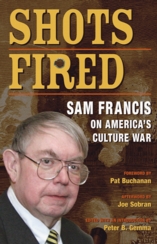
FGF E-Package
Samuel Francis Classics
December 23, 2014

Christmas and the National Question
by Sam Francis
fitzgerald griffin foundation
[classic: December 23, 2004] — The Christmas wars just won’t stop, even though Christmas is right upon us, at least for a year and maybe forever, if the anti-Christmas warriors have their way.
While the warriors have been waging their crusade to make everyone from school kids to presidents say “the holidays” instead of “Christmas,” their allies in the media have been pretending the whole war is just a conservative fantasy.
Thus, liberal columnist E.J. Dionne can’t quite grasp why Christians get so upset about people saying “Happy Holidays” instead of “Merry Christmas.”
“Politicians who speak of ‘the holidays’ instead of ‘Christmas’ now face angry Christian protests,” he asserts.
Well, not really. Most Christians and conservatives simply snicker at that kind of emptiness. What they get upset about is being forbidden to say “Merry Christmas” themselves or call a Christmas tree a Christmas tree, as actually and repeatedly happens. [Peace on Earth? by E. J. Dionne Jr., December 21, 2004]
The controversy is about whether Christians can celebrate or even observe in public their own religious holidays in a country (or even local community) that is overwhelmingly Christian and has been so throughout its history.
The reason they get upset is only in part religious and has nothing to do with intolerance, bigotry, fanaticism, or the other dark passions that secular liberals imagine are what invariably explain any expression of religious belief.
The reason they get upset is that the expression of religious belief and the practice of secular customs derived from religion are being banned.
The name for that is not bigotry but tyranny. And the people who defend it are called liberals.
Mr. Dionne seems to take a moderate position on tyranny. He acknowledges, “There is something defective about a religious tolerance open to every expression of religion except for the faith of those who believe most passionately,” but then again, being a good liberal, you’ve got to think of the other side too, which is:
“What in the world is ‘Christian’ about insisting on saying ‘Merry Christmas’ to a devout Jew or Hindu who might reasonably view the statement as a sign of disrespect? At the level of government: Is it really ‘Christian’ for a religious majority to press its advantage over religious minorities, including nonbelievers?”
The answers, of course, are no and no, and you don’t have to be a liberal to give them.
I don’t think I know a single Christian who would “insist” on saying “Merry Christmas” to a devout non-Christian (or even a non-devout non-Christian), and that’s not at all what the Christmas controversy is about anyway.
Nor can I imagine too many “devout Jews and Hindus” who would regard someone wishing them a Merry Christmas “as a sign of disrespect.”
If Mr. Dionne knows such people, I hope he doesn’t introduce them to me.
Now, “Is it really ‘Christian’ for a religious majority to press its advantage over religious minorities, including nonbelievers?” I would think not, but again that’s not what the controversy is about.
The controversy is about whether Christians can celebrate or even observe in public their own religious holidays in a country (or even local community) that is overwhelmingly Christian and has been so throughout its history.
The larger question is that if non-Christian “religious minorities” are offended by the majority religion of the nation, why did they come here at all?
Why do such minorities invite themselves into a society in which they feel alien and then insist the majority abandon its religious beliefs and national identity so the minority can feel at home?
It’s the Christians who are being pounded for saying “Merry Christmas” or “Christmas tree,” and those doing the pounding are the non-Christians, or their buddies the liberals.
Mr. Dionne winds up quoting Protestant theologian Reinhold Niebuhr: “the chief source of man’s inhumanity to man seems to be the tribal limits of his sense of obligation to other men.”
He adds, “I fear that in these Christmas debates, Christians are behaving not as Christians but as a tribe: ‘We will pound them if they get in the way of our customs and rituals.’”
But I have seen no evidence (and Mr. Dionne offers none) that any Christian has “pounded” anyone.
It’s the Christians who are being pounded for saying “Merry Christmas” or “Christmas tree,” and those doing the pounding are the non-Christians, or their buddies the liberals.
As for “tribal behavior,” Mr. Dionne, like liberals in general, imagines there is this creature called “man” (or nowadays “humankind”) that can somehow be separated from tribe — nation, religion, community, ethnicity, gender, history, culture.
“During my life,” wrote the great French conservative Joseph de Maistre, “I have seen Frenchmen, Italians, Russians, and so on …but I must say, as for man, I have never come across him anywhere; if he exists, he is completely unknown to me.” [Considerations on France, 1797]
De Maistre’s point was that “tribal behavior” is what makes human beings human.
Take it away from “man” or “humankind” and what you get is not “pure man” or “liberated man” but dehumanization, and from that, tyranny.
That’s exactly where the War Against Christmas (and similar wars against other expressions of “tribalism”) is heading.
When it gets there, I’ll bet even liberals, including Mr. Dionne, won’t like it much.
Back to Samuel Francis Classics archives
This article was originally was published by Creators Syndicate, Inc. Copyright © Fitzgerald Griffin Foundation, www.fgfbooks.com. All rights reserved.See Samuel Francis’ biographical sketch and more articles and The Unz Review.
To sponsor the FGF E-Package, please send a tax-deductible donation to the:
Fitzgerald Griffin Foundation
713 Park St., SE
Vienna,VA 22180
or sponsor online.
© 2014 Fitzgerald Griffin Foundation